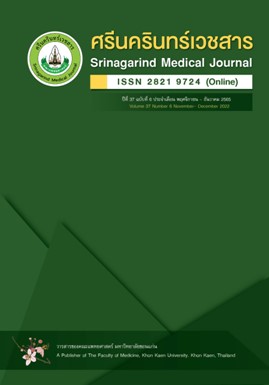ผลของการดูแลจิตใจในผู้ป่วยโรคโควิด-19 หลังรักษาหาย โรงพยาบาลปากน้ำชุมพร
Effect of Mental Health Care for Post-Discharge COVID-19 Patients, Paknam Chumphon Hospital
Abstract
หลักการและวัตถุประสงค์: อาการที่ผู้ป่วยติดเชื้อไวรัสโคโรนา 2019 (โควิด-19) มักพบภายหลังจากรักษาหายแล้ว ซึ่งอาการที่เกิดขึ้นมีความหลากหลายและอาจแตกต่างกันไปในแต่ละบุคคล ซึ่งต้องมีความทุกข์ทรมานจากโรคในระยะเวลาเจ็บป่วยจึงมีผลกระทบต่อคุณภาพชีวิตต่อเนื่องเป็นเวลายาวนาน การศึกษานี้มีวัตถุประสงค์เพื่อศึกษาผลของการดูแลจิตใจในผู้ป่วยโรคโควิด-19 หลังรักษาหาย โรงพยาบาลปากน้ำชุมพร
วิธีการศึกษา: เป็นการศึกษาและพัฒนา กลุ่มตัวอย่าง จำนวน 250 ราย ที่มีประวัติติดเชื้อโควิด-19 ไม่น้อยกว่า 3 เดือน ใช้วิธีการสุ่มตัวอย่างแบบชั้นภูมิ เก็บข้อมูลระหว่างเดือนมิถุนายน-สิงหาคม 2565 แบ่งเป็น 3 ระยะ คือ (1) การวิเคราะห์สถานการณ์และปัจจัยนำเข้า (situation-input) (2) กระบวนการพัฒนา (development process) โครงการดูแลจิตใจในผู้ป่วยโรคโควิด-19 หลังรักษาหาย และ (3) การประเมินผล (evaluation) เครื่องมือที่ใช้เป็นแบบสอบถาม ได้แก่ แบบประเมินภาวะหายใจลำบาก อาการอ่อนล้า ความเครียด ภาวะซึมเศร้า และคุณภาพชีวิต วิเคราะห์ข้อมูลด้วยสถิติเชิงพรรณนา
ผลการศึกษา: ผู้ป่วยหลังติดโรคโควิด-19 มีภาวะหายใจลำบากมากที่สุดคือ เมื่อเดินอย่างเร่งรีบ ร้อยละ 50.0 ขณะออกกำลังกายหนัก ร้อยละ 32.0 และเดินช้ากว่าคนอื่น ร้อยละ 13.6 ตามลำดับ ภาวะอ่อนล้าโดยรวมระดับปานกลาง (mean±SD) (3.32±1.61) มากที่สุดคืออ่อนล้าบ่อย (3.90±1.84) อาการอ่อนล้ารบกวนการทำงาน (3.51±1.88) และการออกกำลังกายทำให้รู้สึกอ่อนล้า (3.44±1.76) ตามลำดับ โดยรวมมีความเครียดเล็กน้อย (1.32±0.88) มากที่สุดมีความเครียดระดับต่ำร้อยละ 44.4 เครียดปานกลาง ร้อยละ 40.8 และเครียดมาก ร้อยละ 13.2 ตามลำดับ โดยรวมมีภาวะซึมเศร้าเล็กน้อย (1.82±1.45) มากที่สุดคือเบื่ออาหาร (1.24±0.93) เหนื่อยง่าย (1.19±0.88) และการนอนหลับยาก (1.08±0.98) ตามลำดับ คุณภาพชีวิตโดยรวมอยู่ในระดับดี (3.35± 0.64) มากที่สุดในด้านสังคม (social) (3.67±0.85) สิ่งแวดล้อม (environment) (3.49±0.77) และจิตใจ (mental) (3.32±0.69) ตามลำดับ
สรุป: ผลของการดูแลจิตใจในผู้ป่วยโรคโควิด-19 หลังรักษาหาย โรงพยาบาลปากน้ำชุมพรครั้งนี้พบว่าโดยรวมมีความเครียดเล็กน้อย ภาวะหายใจลำบากและภาวะอ่อนล้าระดับปานกลาง และคุณภาพชีวิตอยู่ในระดับดี
คำสำคัญ: การดูแลจิตใจ, ผู้ป่วยโรคโควิด-19
Background and Objective: Symptoms of COVID-19 patients often found after treatment, the occurrence of symptoms was diverse and may vary from person to person, who had to suffer from the disease during the illness, thus affecting the quality of life continuously for a long time. This study aimed to study the effect of mental health care for post-discharge COVID-19 patients, Paknam Chumphon Hospital.
Methods: This research and development. The studied subjects consisted of 250 people with a history of infection with coronavirus 2019 (Covid-19) more than 3 months, using a stratified sampling. Data were collected during June-August 2022, divided into 3 phases: (1) situation analysis and input, (2) the development process, a mental care project for post-discharge COVID-19 patients and (3) the evaluation of the questionnaire including the dyspnea, fatigue, stress, depression and quality of life. Data were analyzed with descriptive statistics.
Results: post-discharge COVID-19 patients with the most symtoms were dyspnea when walking quickly, 50.0%, strenuous exercise 32.0% and walking slower than others 13.6% respectively. Overall fatigue had a moderate level (mean±SD) (3.32±1.61). The most was fatigued. (3.90± 1.84), fatigue interferes with work (3.51±1.88) and exercise causes fatigue (3.44±1.76) respectively. Overall of stress had a low level (1.32±0.88) the most stress 44.4%, moderate stress 40.8% and high stress 13.2%, respectively. Overall of depression had a moderate level (1.82±1.45). The most was anorexia (1.24±0.93), tiredness (1.19±0.88) and insomnia (1.08±0.98) respectively. Overall quality of life had a good level (3.35±0.64). The most was social (3.67±0.85), environment (3.49±0.77), mental (3.32±0.69) respectively.
Conclusion: Effect of mental health care for post-discharge COVID-19 patients after caring at Paknam Chumphon Hospital was found that overall of dyspnea and fatigue had a moderate level and quality of life had a good level.
Key words: mental health care, COVID-19 patient


